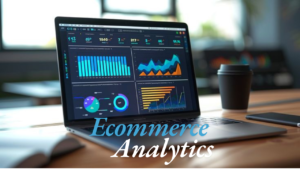Ecommerce analytics is relevant to the point where business strategies become dependent on data analysis. When decision-makers utilize analytics tools, they can control and monitor marketing effectiveness, investigate issues in sales and other processes. These valuable pieces of information enable firms to enhance the customers’ experiences and consequently advance their strategies toward productivity in the aggressive characteristic of ecommerce.
Introduction to Ecommerce Analytics: Unlocking Data-Driven Growth and Key Metrics
Ecommerce analytics is critical in any ecommerce business, especially for those that wish to grow their business and increase profitability. Through the use of analytical tools, companies come with the means of evaluating the data for improving the performance of the business as well as increasing the conversion rate. ecommerce analytics is crucial for companies to help them to improve customers’ satisfaction, optimize business processes and make right decisions based on facts.
The analysis of selected indicators is crucial to achieving greater outcomes with the use of analytics tools. Measurable features like, conversion rate, customers retainment and sales pattern are details that help make the difference. In light of this, there is no better approach than the use of data that ecommerce business entities can use to discover areas of growth and potential challenges, and ways of overcoming them while staying relevant in the marketplace.
Mastering Ecommerce Analytics: Choosing the Right Tools to Decode Performance and Customer Behavior
Choose the right analytics tools and one can improve the analysis of ecommerce data significantly. They give you an all-compassing view of your important KPIs and trends in one convenient place where you can find advice on how to improve your online shop. From performance, marketing, customer experience purposes, the correct tools aid in aligning an ecommerce analytics strategy to business goals.
Web analytics tools are fundamental for businesses as they allow users to comprehend how people approach your Internet shop. These tools assist in the evaluation of matters such as traffic sources, bounce rates, and total session time and thus assist in improving the performance of the website. Having a dashboard allows a business to track their performance and identify weaknesses that may require more attention to increaseоронnement and and conversions.
Customer analysis tools used on user actions and choices make it easy for a business to understand their customers. The above tools assist ecommerce companies in identifying aspects like a buyer’s purchase behavior and their browsing habits, which could be of great value in customizing a customer’s shopping experience. All these analytics solutions help organisations building customer loyalty and make the company ensure sound and long term growth in the world market.

Ecommerce Analytics: Leveraging Marketing, Sales, and Operational Tools for Success
Marketing analytics tools are must to measure the performance of the campaign and have to take decision with evidence. Through the use of such interfaces such as Google Analytics, it is possible for a business to gauge the customers’ data in relation to the return on investments. They assist eCommerce platforms in better defining target audiences and using their available budgets in the most effective ways possible to design better campaigns that will increase levels of interaction and conversion.
The product sale and revenue and other business operational tools provide fundamental data for total business results. It helps to track things like inventory, revenue, and so forth, so it assists in decision making processes. Using such tools, ecommerce platforms can optimize process, avoid stockouts, and adapt objectives and strategies according to dynamics and customer demand to encourage growth through making strategic decisions amidst intense competition.
Ecommerce Analytics: Harnessing Marketing, Sales, and Operational Tools for Strategic Growth
Ecommerce analytics tools are very useful tools for measuring the effectiveness of marketing campaigns and for ongoing growth. The use of data ensures that marketing concerned with the results generated in different marketing campaigns, observe patterns to improvement of strategies as a way of ensuring better results. Marketing analytics can also be used to monitor effectiveness and reach of ads, customer interactions and improved conversion rates while making sound business decisions.
Nothing captures the financial performance of an organization than a well-implemented sales and revenue tracking tools. These tools are essential in giving you information on your business and aspect such as revenue, average order value & frequency of purchases. Ecommerce analytics tools can identify poorly performing areas and provide value-added decisions that contribute to profitability, future business expansion, and better sales process continually over time.
Inventory and operations management tools make business management possible by tracking the availability of materials and products in line with demand rates and chain performance. Opinion on how business can use analytics to avoid common mistakes like overstocking or a stock out situation are highlighted below. The utilization of analytics promotes organisational objectives to allow efficiency and customer satisfaction due to increased competition within ecommerce.



